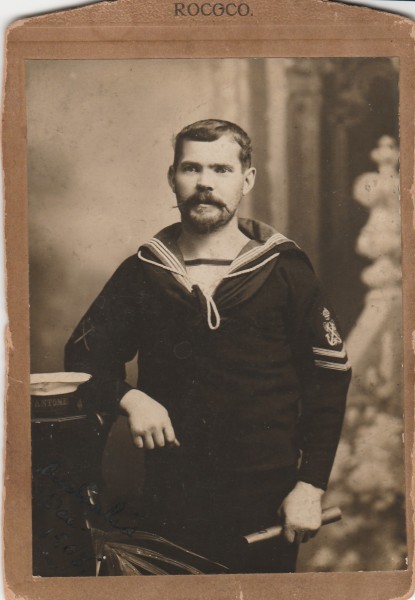
Thomas Bevan Royal Navy, Australia 1908
I was too young to know my maternal Great-Grandfather, Thomas Bevan. However, I do have some memories of him – mainly in his casket – in the front room of his house at number nine, Pellow Place Stoke, Plymouth Devon. The coffin stayed in the house for 7 days before the burial. My gran said I had to kiss him goodbye so that I would have pleasant memories of him and no nightmares!
Thomas was born in the little ancient town of Okehampton in West Devon on the Northern edge of Dartmoor and had a population of less than 6,000 in 2011.
The name Okehampton means settlement or estate (tun) on the River Okement and was founded by the Saxons. The earliest written record of the settlement is from 980 AD. The early form of the name Okementone is recorded in the Domesday Book of 1086, and later in 1167 and 1275 as Okemento(a).
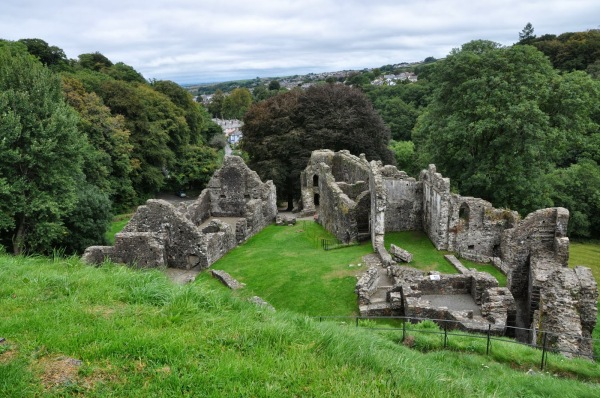
Like many towns in the West Country, Okehampton grew on the medieval wool trade. Notable buildings in the town include Okehampton Castle, now a ruin, established by the Norman Sheriff of Devon, Baldwin FitzGilbert. following a revolt in Devon against Norman rule.
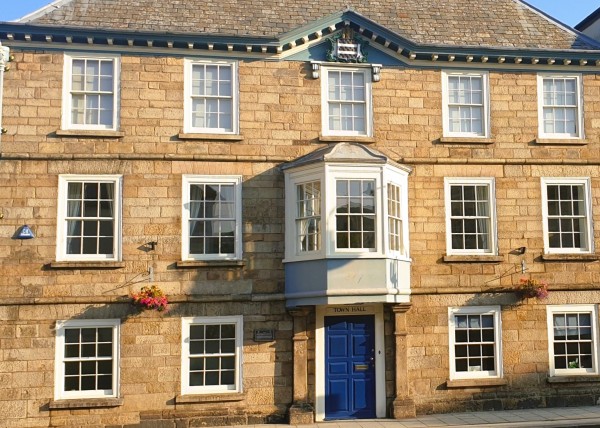
The 17th-century Okehampton Town Hall.
My Granny used to pronounce it as “Okenton”. Apparently, as late as the 1930’s the older people of the district pronounced it “Okington” or “Okenton” I asked Granny why she said it that way, and she said that was how her Father pronounced it. (1)
On the 18th of October, 1893, when Thomas was 18 years and 10 months old, he joined the Devonshire Regiment for ‘Short Service’.
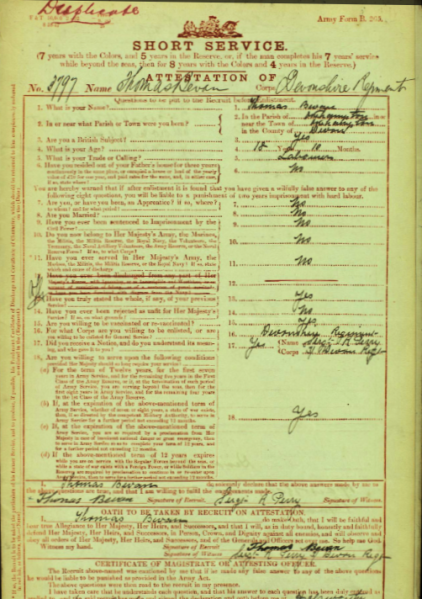
The term “short service” refers to a type of enlistment in the British Army, introduced in 1870. It allowed soldiers to serve for a shorter time than the standard 12 years of service. Thomas served for eight years and then joined the Royal Navy at age 25.
According to his records, when he joined the Royal Navy for a 12-year engagement on the 20th of March 1900, two years were added to his birth year. He was born in 1875 but his Royal Navy service Records show 1877.
Thomas became a Cooper and Master Carpenter on HMS Vivid II. This was a shore establishment, in the Devonport Dockyard in Plymouth, where I was born and lived. He may have learned of the rules regulations and history of the Royal Navy whilst there and probably picked up the basics of his trade too. According to his Service Record below, he served on many different ships and finished his service 12 years later, also on HMS Vivid III. (2)
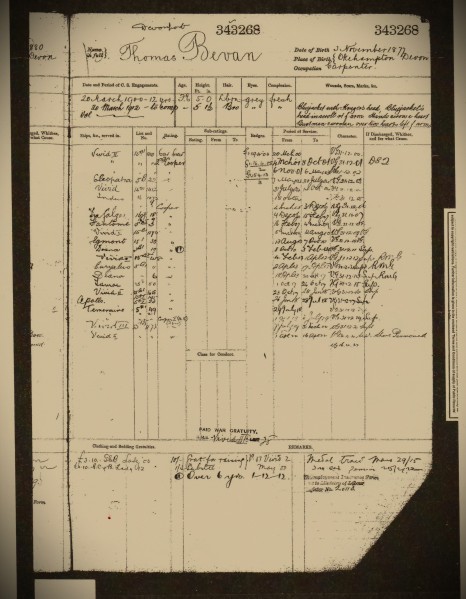
Thomas Bevan’s Royal Navy Service Record
Granny told me that Thomas made and repaired wooden barrels, casks and other containers. The daily Rum ration for the Royal Navy, called the ‘tot’ for the crew was stored in a barrel such as Thomas would have made. The daily tot was abolished in 1970; I remember it made headlines in England. The reason was concerns that the intake of strong alcohol would lead to unsteady hands when working machinery.
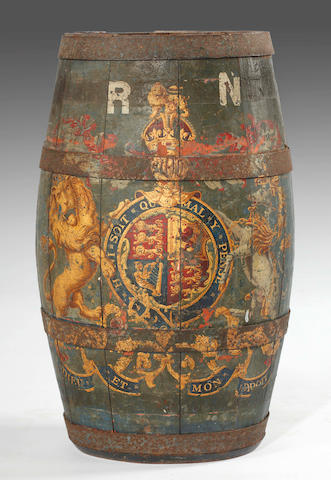
A Scarce Royal Navy Rum Barrel made of English oak painted overall in blue faded to green on the front. Bound with four iron bands, the front was painted with post-1901 Royal Arms and R.N. and retained trace imprints of earlier bands.
Thomas lived with his wife, Lilian, their daughter Edith O’Bray (my Granny) and her husband Percival Victor (my Grandfather) in the early 1950’s in Plymouth at number nine Pellow Place Stoke. I lived with my parents five doors down from them at number four.
Although my Granny, Edith was born in 1900, her mother Lillian was single. Lillian’s father, a gardener named Thomas Symons, went to the Royal Navy to find the child’s father. Thomas had no idea he was a father as he was at sea for three years. When Thomas did arrive home on HMS Cleopatra in 1904 he married Lillian and the family went on to have six more children. Granny was already four years old then. The following link explains those circumstances.
https://genealogyensemble.com/2015/11/18/the-family-secret/
My Granny, his daughter, told me that her father tragically died in her house, whilst asleep in his chair. Everyone had gone shopping and when they arrived home, the house smelled of gas and Thomas was dead. Apparently, gas had leaked into the house, killing him. She told me he was a kind, quiet man.
The photo below of him at 71, was taken about one year before his unfortunate death on the 31st of May, 1947.
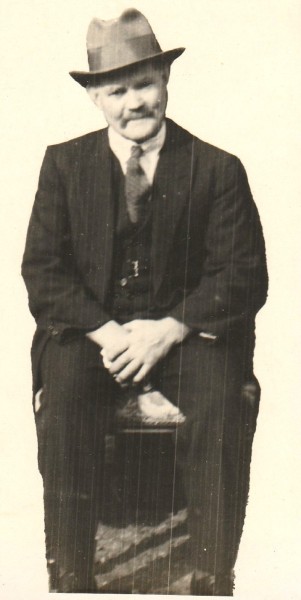
Great-Grandad Thomas Bevan
SOURCES
(1) https://en.wikipedia.org/wiki/Okehampton
(2) https://en.wikipedia.org/wiki/HMS_Vivid_(1891)
(3) https://en.wikipedia.org/wiki/Okehampton_Town_Hall
The Royal Navy in the year 1900 had several tradesmen who were responsible for the maintenance of the ships and their equipment. One such trade was that of a cooper. A cooper is someone who makes wooden, staved vessels, held together with wooden or metal hoops and possessing flat ends or heads. Examples of a cooper’s work include casks, barrels, buckets, tubs, butter churns, vats, hogsheads, firkins, tierces, rundlets, puncheons, pipes tuns butts, troughs pins and breakers.





